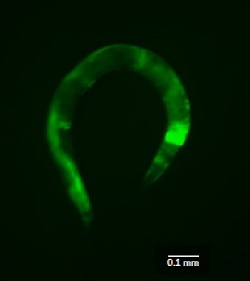 |
| Green fluorescence marking stress in a mutant worm--Courtesy of CHOP |
Marni Falk, the director of the Mitochondrial-Genetic Disease Clinic at The Children's Hospital of Philadelphia (CHOP), is preparing a pilot human study to test a promising theory for treating mitochondrial diseases.
In rare cases, malfunctioning mitochondria are responsible for interfering with the body's natural flow of electricity. Falk's team has been doing animal research related to a key metabolic product, nicotinamide adenine dinucleotide, or NAD+, which is responsible for regulating a large number of chemical reactions inside a cell. Mutations that prevent the metabolic conversion of NADH to NAD+ can create energy shortages for the heart, brain, eyes, muscles and more, they add.
Using microscopic worms called Caenorhabditis elegans, the team found that nicotinic acid (Niacin) fixed that problem and restored life spans. And other existing drugs may also prove effective in treating mitochondrial diseases.
"In contrast to research that aims to repair defective mitochondria, we are bypassing the damaged mitochondria and focusing instead on how cells respond to mitochondrial problems," said Falk. "We're restoring the ratio of critical metabolic precursors and products that control signaling pathways, thereby improving overall cellular health in respiratory chain diseases."
Falk is now readying a pediatric study that will test this approach in the clinic for complex I deficiencies. Ultimately, any effective therapeutic approach will require combo therapies, says the investigator. But she believes this could be an important part of that overarching approach.
"We're enthusiastic that we have reached a major threshold on the path toward bringing important new therapies to a very challenging group of diseases," she added.
- here's the release